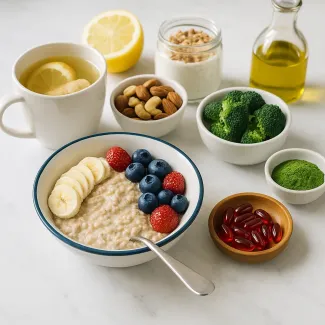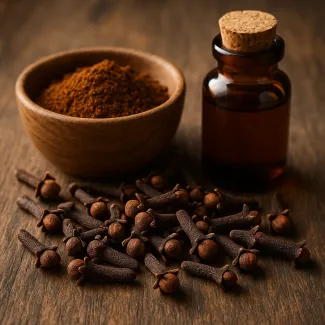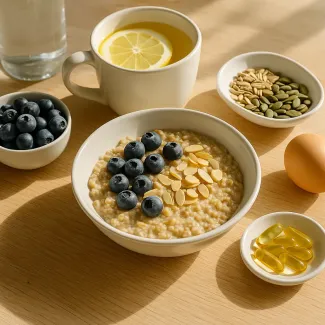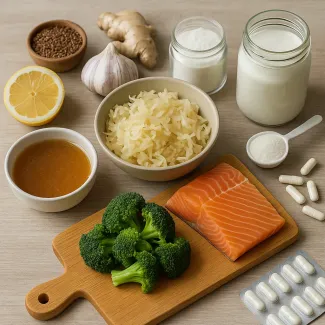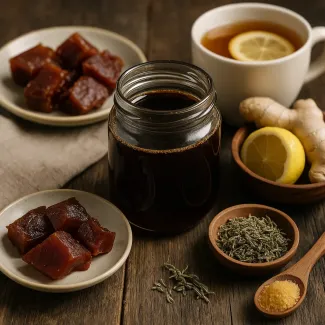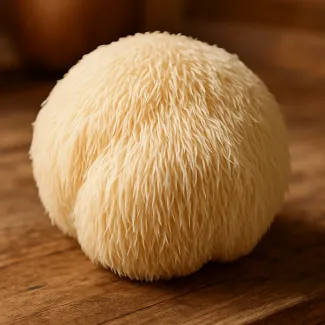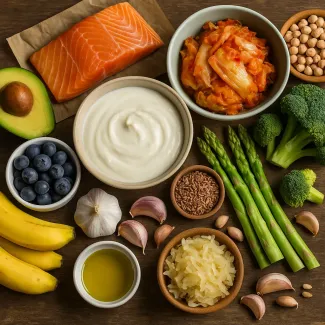
Strengthen Your Gut and Immune System with Everyday Nutritional Choices
Discover the Essential Role of Food in Digestive and Immune Wellbeing
The link between your gut health and immune system is far more intricate than once believed. Science now shows that what you eat can directly impact the balance of your gut microbiome, which in turn influences how well your body defends itself from illness. A well-nourished gut contributes to better digestion, clearer skin, improved energy levels, and mental resilience — all foundational elements of whole-body health. By choosing the right foods, you can nourish your gut microbiota, regulate inflammation, and enhance your immune defenses naturally.
This article explores the most powerful gut-friendly foods and daily habits that help balance your microbiome and support immune function. Whether you're in your 30s or 60s, small dietary adjustments can make a profound difference.
The Gut-Immune Axis: Why Your Digestive System Shapes Your Defenses
Understanding the microbiome’s control center
Your gut is home to over 100 trillion microorganisms, primarily bacteria, which collectively form your gut microbiota. These microbes aren't just passive passengers — they produce essential vitamins, regulate inflammation, help digest food, and influence the development of immune cells. A balanced microbiome trains your immune system to respond appropriately to pathogens while avoiding unnecessary reactions like allergies or chronic inflammation.
How the gut and immune system communicate
Approximately 70% of your immune system resides in your gastrointestinal tract. This physical and chemical relationship between gut microbes and immune cells is known as the gut-immune axis. When your microbial balance is off — a condition known as dysbiosis — your immune defenses weaken, making you more susceptible to infections, autoimmune issues, and systemic inflammation.
Prebiotic Foods: Feed the Good Bacteria in Your Gut
Why prebiotics are the foundation of microbiome balance
Prebiotics are specific types of dietary fiber that your body can’t digest — but your gut bacteria can. These fibers serve as fuel for beneficial microbes, allowing them to thrive, multiply, and outcompete harmful organisms. Increasing your intake of prebiotic-rich foods is one of the most effective ways to naturally enhance gut health.
Top prebiotic-rich foods to eat regularly
- Chicory root – extremely high in inulin, a powerful prebiotic fiber.
- Jerusalem artichokes – also rich in inulin, supports bifidobacteria growth.
- Garlic and onions – contain fructooligosaccharides (FOS) and inulin.
- Leeks and shallots – great for feeding gut bacteria and regulating digestion.
- Bananas (especially underripe) – source of resistant starch and pectin.
- Asparagus – supports healthy microbial activity and anti-inflammatory pathways.
Eating a combination of these plant-based prebiotic sources supports long-term microbial diversity and better immune function.
Probiotic Foods: Reinforce Your Gut with Friendly Bacteria
What probiotics do and why you need them
Probiotics are live bacteria that, when consumed in adequate amounts, offer health benefits by restoring the gut’s natural microbial balance. They’re especially useful after antibiotic use, during times of stress, or when your diet has been low in fiber and fermented foods.
Fermented foods high in natural probiotics
- Yogurt (with live cultures) – rich in Lactobacillus and Bifidobacterium strains.
- Kefir – a fermented dairy or non-dairy drink with over 30 strains of beneficial microbes.
- Sauerkraut and kimchi – unpasteurized versions are powerful sources of lactic acid bacteria.
- Tempeh – fermented soybeans packed with protein and natural probiotics.
- Miso and natto – traditional Japanese fermented soy products beneficial for gut flora.
- Pickles (naturally fermented) – not vinegar-pickled, but lacto-fermented varieties.
Incorporating a variety of fermented foods into your weekly routine strengthens your gut ecosystem and boosts resilience against infections.
Fiber-Rich Foods: The Unsung Heroes of Digestive Strength
The power of soluble and insoluble fiber
Dietary fiber plays a dual role in supporting gut health: it feeds beneficial bacteria (soluble fiber) and keeps your digestion moving (insoluble fiber). Together, these fibers help maintain regular bowel movements, prevent constipation, and reduce intestinal inflammation — all of which are crucial for a healthy gut barrier and immune activation.
Fiber-rich whole foods to include daily
- Legumes – lentils, chickpeas, and black beans are rich in both fiber types.
- Whole grains – oats, barley, quinoa, and brown rice support long-term gut health.
- Berries – high in antioxidants and soluble fiber (especially raspberries and blackberries).
- Apples and pears – contain pectin, which enhances the mucosal lining of the gut.
- Flaxseeds and chia seeds – excellent for bowel regularity and feeding microbes.
A high-fiber diet improves gut microbial richness, enhances metabolic markers, and supports sustained energy levels throughout the day.
Polyphenol-Rich Foods: Antioxidants That Feed Gut Bacteria
What are polyphenols and how do they work in the gut?
Polyphenols are plant compounds with strong antioxidant properties. In the gut, they serve as fuel for beneficial bacteria, particularly species like Akkermansia muciniphila, which supports gut lining integrity and reduces inflammation.
Foods loaded with polyphenols that promote microbial diversity
- Dark chocolate (70%+ cacao) – supports gut health and heart health.
- Green tea – high in catechins, which reduce oxidative stress in the gut.
- Berries – rich in anthocyanins, potent anti-inflammatory compounds.
- Olives and extra virgin olive oil – contain hydroxytyrosol, linked to microbiome modulation.
- Red grapes and red wine (moderate) – contain resveratrol, known to support Bacteroidetes.
These plant-based polyphenols also enhance the production of short-chain fatty acids (SCFAs) — key molecules that lower inflammation and feed colon cells.
Bone Broth and Collagen: Building Blocks for Gut Lining Repair
How gelatin and amino acids restore digestive integrity
Bone broth is rich in collagen, glutamine, and glycine, which support the repair and maintenance of the intestinal wall. A strong gut lining prevents the leakage of toxins and pathogens into the bloodstream — a phenomenon known as leaky gut.
How to incorporate gut-healing broth into your diet
- Sip warm bone broth in the morning or before meals.
- Add it to soups, stews, or use as a base for cooking grains.
- Choose slow-cooked broths made from grass-fed bones or make your own at home.
Adding bone broth or collagen supplements to your regimen can significantly reduce intestinal permeability and promote gut-immune equilibrium.
Omega-3 Fatty Acids: Reduce Inflammation, Support Microbiota
The anti-inflammatory role of omega-3s in the gut
Omega-3 fatty acids, particularly EPA and DHA found in fatty fish, reduce the production of pro-inflammatory cytokines and promote the growth of beneficial microbes.
Sources of omega-3s to include regularly
- Salmon, mackerel, sardines – cold-water fish rich in EPA/DHA.
- Chia seeds and flaxseeds – plant-based ALA, which the body converts to omega-3s.
- Walnuts – a versatile snack with anti-inflammatory benefits.
- Algae oil – a vegan alternative rich in DHA.
These fats protect the intestinal lining, reduce systemic inflammation, and improve the ratio of beneficial to harmful bacteria.
Hydration and the Gut: Water’s Role in Digestive Health
How fluids support digestion and nutrient absorption
Proper hydration supports stool formation, promotes bacterial motility, and assists in nutrient absorption. Without enough water, digestion slows down, which may disrupt microbial balance and hinder detoxification pathways.
Hydration tips for optimal gut function
- Drink 1.5 to 2 liters of water daily, more in warm climates or during exercise.
- Add electrolytes or lemon for added gut support and absorption.
- Include herbal teas like ginger, peppermint, or chamomile to calm digestion.
Maintaining fluid balance keeps your digestive tract running smoothly and helps transport nutrients to immune cells.
Avoiding Gut Disruptors: Foods and Habits That Harm Microbiome Balance
Common triggers that damage your microbiome
- Highly processed foods – loaded with additives, preservatives, and emulsifiers that disturb microbial composition.
- Excessive alcohol – damages the gut lining and kills beneficial microbes.
- Artificial sweeteners – particularly aspartame and sucralose can alter microbial diversity.
- Chronic stress – disrupts gut motility and microbial equilibrium.
- Low-fiber diets – starve good bacteria, allowing harmful species to take over.
Minimizing these disruptors gives your microbiome space to flourish and your immune system more tools to protect you.
Lifestyle Habits That Support a Resilient Gut-Immune Connection
Sleep, movement, and stress reduction matter
A holistic approach to gut health goes beyond food:
- Prioritize 7–9 hours of sleep per night to allow microbial regeneration.
- Exercise moderately – walking, yoga, or resistance training improve gut motility.
- Practice mindfulness or meditation – lowers cortisol, reducing inflammation and microbiome disruption.
The synergy of nutrition and lifestyle habits is what truly strengthens your gut-immune alliance.
Spices and Herbs That Naturally Support Microbiome Balance
Culinary additions with therapeutic potential
- Ginger – anti-inflammatory and digestive-stimulating.
- Turmeric – curcumin supports microbial diversity and gut lining repair.
- Cinnamon – promotes microbial richness and glucose balance.
- Garlic – both prebiotic and antimicrobial, depending on dosage.
- Oregano and thyme – contain natural antimicrobials that reduce harmful overgrowth.
Incorporating these functional herbs in daily cooking adds flavor while delivering microbiome support.
Daily Meal Ideas to Nourish Your Gut and Immune System
Easy ways to incorporate gut-healthy foods into your routine
Breakfast
- Overnight oats with chia seeds, berries, and flax.
- Kefir smoothie with banana, ginger, and turmeric.
Lunch
- Quinoa salad with chickpeas, arugula, and fermented veggies.
- Miso soup with tempeh and seaweed.
Dinner
- Grilled salmon with steamed asparagus and sauerkraut.
- Lentil stew with garlic, leeks, and olive oil.
Snacks
- Greek yogurt with raspberries and walnuts.
- Apple slices with almond butter and cinnamon.
These meals combine fiber, probiotics, polyphenols, and omega-3s in simple, accessible formats that support microbial strength.
Natural Supplements to Consider for Gut-Immune Health
When food isn't enough, supplements can help
- Probiotic capsules – look for diverse strains (10+), 10–50 billion CFUs.
- Prebiotic powders – acacia fiber or inulin to support growth of good bacteria.
- Glutamine – helps repair gut lining.
- Digestive enzymes – aid in breaking down proteins, fats, and carbs.
- Zinc and vitamin D – crucial for immune signaling and gut wall maintenance.
Always choose high-quality, third-party tested products and consult a healthcare professional before starting a new supplement regimen.
Age-Specific Gut Health Tips: How Needs Evolve After 30
Your 30s
- Start introducing probiotic-rich foods and focus on fiber to build long-term resilience.
- Address stress and optimize sleep for microbial diversity.
Your 40s
- Support hormonal balance with fermented soy and omega-3s.
- Increase intake of collagen-rich broths to strengthen gut lining.
Your 50s
- Emphasize anti-inflammatory foods and antioxidants like polyphenols.
- Watch out for slowing motility — increase fiber and hydration.
Your 60s and beyond
- Focus on immune-enhancing nutrients and diverse plant-based meals.
- Stay active and maintain consistent probiotic intake.
Your gut evolves with you. Tailoring your nutrition by age supports lasting microbial health and stronger immune defense.
